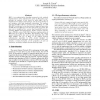Free Online Productivity Tools
i2Speak
i2Symbol
i2OCR
iTex2Img
iWeb2Print
iWeb2Shot
i2Type
iPdf2Split
iPdf2Merge
i2Bopomofo
i2Arabic
i2Style
i2Image
i2PDF
iLatex2Rtf
Sci2ools
195
click to vote
SIGCOMM
1995
ACM
1995
ACM
Performance Analysis of MD5
MD5 is an authentication algorithm proposed as the required implementation of the authentication option in IPv6. This paper presents an analysis of the speed at which MD5 can be implemented in software and hardware, and discusses whether its use interferes with high bandwidth networking. The analysis indicates that MD5 software currently runs at 85 Mbps on a 190 Mhz RISC architecture, a rate that cannot be improved more than 20-40%. Because MD5 processes the entire body of a packet, this data rate is insufficient for current high bandwidth networks, including HiPPI and FiberChannel. Further analysis indicates that a 300 Mhz custom VLSI CMOS hardware implementation of MD5 may run as fast as 256 Mbps. The hardware rate cannot support existing IPv4 data rates on high bandwidth links (800 Mbps HiPPI). The use of MD5 as the default required authentication algorithm in IPv6 should therefore be reconsidered, and an alternative should be proposed. This paper includes a brief description of th...
Related Content
| Added | 26 Aug 2010 |
| Updated | 26 Aug 2010 |
| Type | Conference |
| Year | 1995 |
| Where | SIGCOMM |
| Authors | Joseph D. Touch |
Comments (0)

